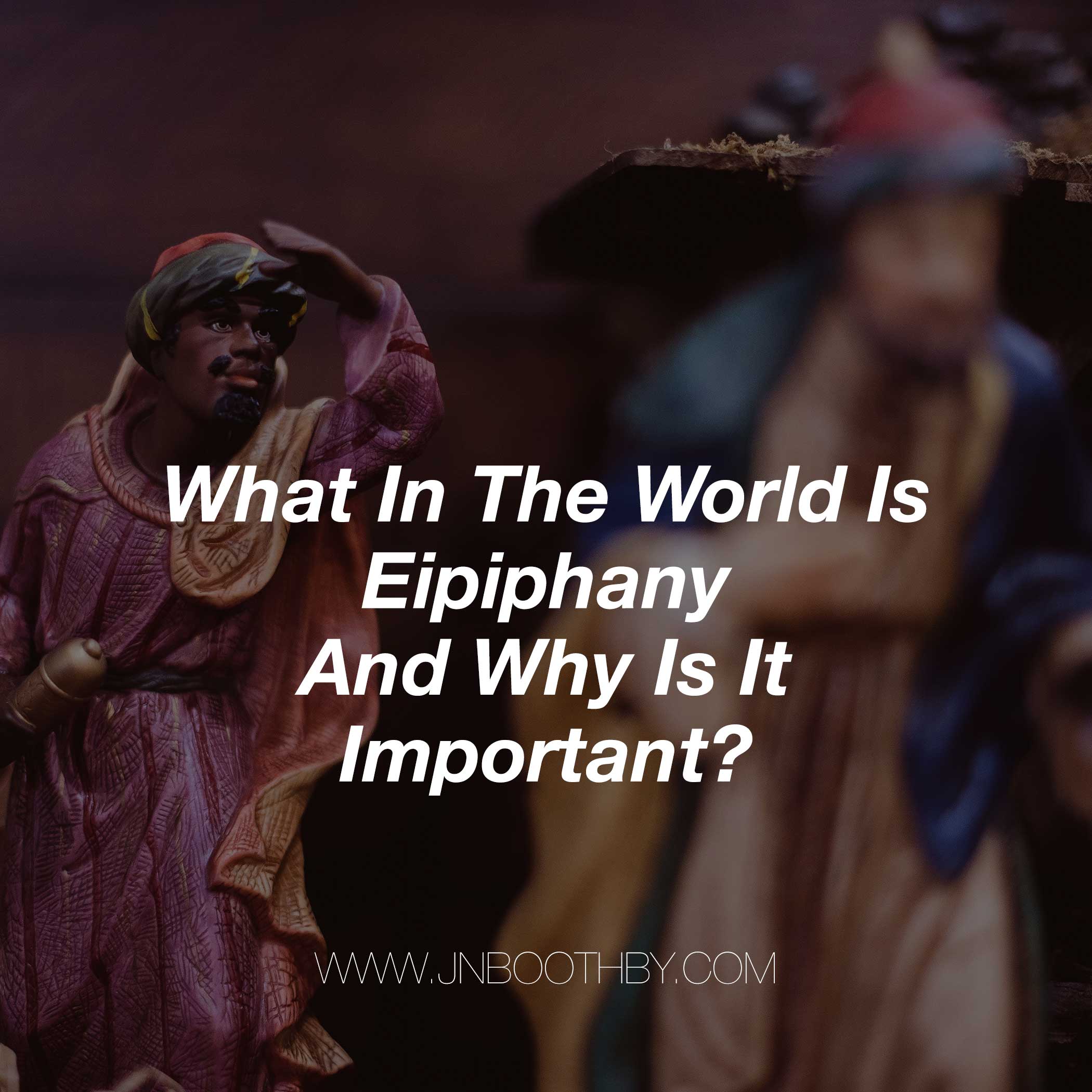What In The World Is Epiphany And Why Is It Important?

Epiphany
Epiphany. It’s kind of a fun word to say. And today, January 6, is the day many Christians around the world celebrate “Epiphany.” For some, however, this more ancient holiday has been lost and forgotten. We know the word today as a phrase to mean you’ve had a profound idea like Isaac Newton with the apple falling from the tree. There is more to the word, however than just a good idea.
Epiphany: “A moment of sudden and great revelation or realization.” It can also have the definition of “manifestation.”
Throughout history, different rulers and kings have used the word “Epiphany” in the form “Epiphanes,” which means “God Manifest.” I recently taught an 8 part series on Hanukkah that reveals the horrible nature of Antiochus IV also known as Antiochus Epiphanes. However, this idea that average people were somehow divine in nature was nothing new. The Pharaohs of old usually claimed some form of divine nature and it moved right along into Roman culture where “Caesar is Lord” was the normal phrase. It’s why saying something like “Jesus is Lord” was not only looked down on but met with punishment and crucifixion.
Wait…so the Magi weren’t there at Jesus’ Birth?
While many nativity scenes during the Christmas season depict the “three wise men” sitting around the manger, the biblical account simply does not reveal this stage. Matthew’s account in 2:1 tells us that after Jesus was born the Magi came to Judea looking for the “King of the Jews.” We aren’t sure when the Magi actually showed up but it likely was not the same night of his birth like many modern Christmas stories try to tell. The bible also doesn’t say how many Magi actually showed up, we just know they presented three gifts. If you’re looking for a funny, yet more accurate depiction of this night, I highly recommend this video: https://skitguys.com/videos/retooning-the-nativity
Who were they and why were they interested in the “King of the Jews”?
The Magi were most likely Persian priests who practiced an ancient Babylonian method for astrology. Remember that only a few centuries earlier the Jews were in exile in Babylon. This makes a strong case for why these “wise men” were familiar with Jewish messianic prophecies (See Archaeology Study Bible, p. 1368).
Surprisingly enough, this story is quite relevant to recent astronomical events. Unless you were living under a rock a couple of weeks ago, you saw posts about the “Christmas Star.” This “Great Conjunction” between Saturn and Jupiter took place on December 21st and came the closest together they had been since 1623. Unfortunately, this rare celestial event was not likely linked to the Christmas Star of Jesus’ birth.
Nevertheless, there is a possibility that Jupiter was still involved in the original Christmas Star story. Dr. Michael Molnar has been able to trace back the sky to March 20 and April 17, 6BCE. During that time there was a double occultation of Jupiter (Jupiter passed behind the moon and was obstructed from sight). Jupiter represented the Greek god Zeus. For the ancient astronomers, this meant that there was a regal birth of a divine king. But that’s not all. This particular celestial event took place within the constellation Aries.
Dr. Molnar claims that historians and astronomers such as Claudius Ptolemy in the first century CE believed this constellation was associated with events in Judea. So we can deduce if this theory is correct (which, we can’t know for certain) is that well-educated astrologers saw a sign of a divine king being born in Judea on April 17, 6BCE and then began their journey to see this King. This would actually support Matthew’s story because the Magi went to Herod first. They didn’t know where exactly in Judea the event took place. It also confirms that because Jews were not allowed to practice astronomy, Herod had no clue when the event took place. What about the star that settled over Bethlehem? There’s a theory about that too. Listen to this podcast for the whole story.
What does Epiphany have to do with us today?
Epiphany, then, celebrates the revelation to gentiles that God had become incarnate and was dwelling among them (Immanuel). Epiphany is the announcement to the gentiles that they are welcome to participate in the Kingdom of Yahweh that would be established on earth forever through Yeshua the Messiah. In the stories of Jesus’ birth we see not only the lowly shepherds who are welcome to celebrate the Messiah but also “astrology-practicing gentiles” which for Jews was a huge no-no! God was so invested in reaching the gentiles that he used pagan practices (really His creation) to proclaim the Good News that He was now among them. God, through Jesus, was establishing a New Covenant which meant inclusion for all people, not only the Jews. Isaiah was right, salvation would come to the gentiles and the ends of the world through the Jews. And from the onset, Jesus was shaking things up with his entry into this world (Isaiah 42:5-7, 49:6).
As Gentile followers of Jesus, we can observe and celebrate this day by thanking God for coming to earth and allowing us into His Kingdom. My suggestion is to take today and reflect and meditate on what we call the “Kenosis Passage” (Kenosis means emptying in Greek). It’s Philippians 2:5-11 and it says this:
In your relationships with one another, have the same mindset as Christ Jesus:
Who, being in very nature God,
did not consider equality with God something to be used to his own advantage;
rather, he made himself nothing
by taking the very nature of a servant,
being made in human likeness.
And being found in appearance as a man,
he humbled himself
by becoming obedient to death —
even death on a cross!
Therefore God exalted him to the highest place
and gave him the name that is above every name,
that at the name of Jesus every knee should bow,
in heaven and on earth and under the earth,
and every tongue acknowledge that Jesus Christ is Lord,
to the glory of God the Father.”
Maranatha // מרנאתא
-Justin
I’d love for you to join in with me as we meditate on Philippians 2:5-11.
Want to grow spiritually in 2021? Grab my free PDF guide with practical biblical practices to get you started!
Leave A Comment
I’d love to hear your thoughts on this article! Please remember to be kind and respectful. If you didn’t like something, I always welcome constructive criticism. However, any form of hatred, bullying, or racism will not be tolerated.

About The Author
Justin Boothby is a lifelong student who loves to travel, film, write, design websites, and life coach. Most importantly he loves to Pastor in all different kinds of ministry settings. He’s also an avid pizza lover, metalcore listener, and shot glass collector.
Join me in my latest Lectio Divina session.
Recent Blog Posts

A Different Christian Perspective On Abortion
As a Christian in America, I’ve had to reimagine my faith on many topics. After listening to so many stories on abortion, I had to reimagine my faith when it comes to abortion.

The End Times: From Deconstruction To Reimagination
Who cares about the end times? Let’s be honest, Jesus is probably going to come back before you finish reading this article anyway!

Political Identity: From Deconstruction To Reimagination
Is my identity found in my political party or in Jesus of Nazareth? And if it is found in Jesus, am I really bringing His Kingdom to earth?

From Deconstruction To Reimagination: Introduction
Deconstruction is the buzzword in many Christian circles today and I want to help those in that journey reimagine how to follow Jesus.
About The Author

Justin is a lifelong student who loves to speak, travel, film, write, and coach. He has a goal of empowering others to grow closer to Jesus in practical and unique ways. After acquiring two degrees in Practical Theology and then studying in Israel for two years, Justin has a passion to help people read the Bible with a deeper appreciation in its original, ancient context.
M.A. Hebrew University of Jerusalem
M.Div. Regent University
B.S. Southeastern University


